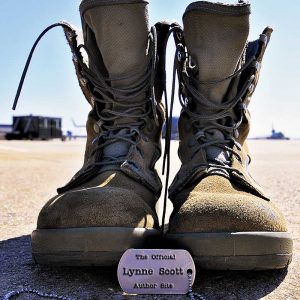Question: How do you know where to start? What makes a great opening line?
Answer: Damned if I know. I just sit down and hope for the best. If it doesn’t work out, I dump it and try again. Eventually, I either find the opening, or I pass out from holding my breath.
There’s a cute little poster floating around on the Internet that sums it up nicely: “Alcohol! Because no great novel begins with someone eating a salad.” I agree. That’s why The Civilian – Blood Link IV doesn’t begin that way… although, the opening was inspired by that saying.
Dr. Carolyn Brinn stared at the plate holding a lump of tuna salad on a sad, limp, pale leaf of lettuce and decided it was time for a change. She’d picked up the plate only a moment before, but she realized she wasn’t interested in moving the plate from the refrigerated cabinet to her tray.
Enough with the healthy crap. I need cake.
Finding the opening for your novel is considered to be the hardest thing writers do. I try not to think too hard about it. If I do, then I also begin to think about how nice it would be to have a nice shot of Jack Daniels.
Some writers agonize for days over the opening, but I go back to the old adage of just tell the damn story. My process is to pick a point and go from there. Remember, it’s a draft. If you find a better spot later, you can adjust. I usually try to come into people’s lives when something is happening or about to happen. You shouldn’t be afraid to open with dialogue and it’s perfectly okay if the person speaking isn’t your lead character. Ideally, you want to try to give the reader a taste of who your lead character is without overloading them.
From Protecting Parker:
“I’m sorry, Parker. Alex dropped off the keys three days ago, along with the divorce papers.” Colonel Adam Henderson looked at her with pity as he handed her the large brown envelope. “You were already headed back and there was no way to contact you. Katy and I went to the storage unit and… well… it’s a damn mess. He pretty much pitched everything in. Nothing’s boxed or bagged.”
With a dazed expression, Air Force First Sergeant Parker Cotton took the envelope from her commander, unable to believe Alex had dumped her stuff in a storage unit and filed for divorce while she was deployed.
The hardest thing you will do as a writer is take the first step of placing words on the paper. The opening lines are a commitment to the rest of the story.
I was hanging out in an online chat in which aspiring authors could ask a senior editor for a major publisher questions. One of the questions asked was “What do you hate to see in the opening of a story?”. The editor promptly responded that she hated the contrived meetings of people spilling drinks on each other or sitting next to each other on a plane. She says that those two meetings so bother her that she often has trouble getting past them even if everything else about the story and the author excite her.
I had already published A Shared Fear in which Evie and Joe meet on an airplane. Of course, my airplane is about to crash, but it’s still the dreaded airplane meeting. Interestingly enough, the inflight emergency is one of the first things that people bring up when we discuss the book. My readers loved the idea that the mundane became the terrifying. It sets the tone for the entire book.
Don’t listen to anyone else when you start. Just write what works for you!

